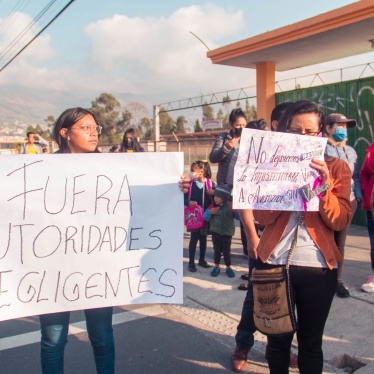Mexico, the United States, and Canada have ignored critically important labor rights obligations under the North American Free Trade Agreement (NAFTA), Human Rights Watch said in a comprehensive new study Trading away rights.The Unfulfilled Promise of NAFTA's Labor Side Agreement.
On the eve of the Quebec summit of Western hemisphere leaders, Human Rights Watch called for the creation of an independent oversight agency to spur remedial action for workers' rights violations.
"The NAFTA experience is an important lesson for any future trade agreements," said Jos?Miguel Vivanco, executive director of the Americas division of Human Rights Watch. "Our research shows that agreements on labor will never work without the active support of the countries involved. In the case of NAFTA, these three countries have actually worked to minimize the impact of the labor provisions."
Vivanco urged that the proposed Free Trade Area of the Americas (FTAA), a key agenda item at the Quebec summit, should be designed to avoid the weaknesses of the NAFTA regime.
The 64-page report, "Trading Away Rights: The Unfulfilled Promise of NAFTA's Labor Side Agreement," analyzes the twenty-three complaints filed under the accord since it came into force in 1994. The complaints allege systematic workers' rights violations in all three countries - fourteen in Mexico, seven in the United States, and two in Canada. Companies named as violators include General Electric, Honeywell, Sony, General Motors, McDonald's, Sprint, and the Washington State apple industry.
The NAFTA labor provisions, known formally as the North American Agreement on Labor Cooperation (NAALC), are the most ambitious link between trade and labor rights ever implemented, Human Rights Watch said. They include eleven "labor principles" including freedom of association, discrimination, and minimum wage. The accord also requires the signatories to have high labor standards and provide access to fair labor tribunals.
Complaints filed under the NAALC so far have cited favoritism toward employer-controlled unions; firings for workers' organizing efforts; denial of collective bargaining rights; forced pregnancy testing; mistreatment of migrant workers; life-threatening health and safety conditions; and other violations of the eleven "labor principles."
Human Rights Watch said that not one of the 23 complaints filed under NAALC had so far resulted in sanctions against an alleged labor rights violator.
Human Rights Watch urged that labor rights protections should be recognized as an integral part of any trade agreement, rather than being relegated to a side accord. It also said that sanctions should be used to punish any violation of the NAALC's labor principles and obligations, not only non-enforcement of laws that fall within the narrow categories established under NAALC.
The NAALC rules currently lack standards for accepting or rejecting cases, for following up on issues raised by petitioners, or for deciding what constitutes an appropriate government response to violations. But Human Rights Watch said the NAALC could be used much more effectively, even in its current form, if its oversight bodies were more aggressive in pursuing violations. Unfortunately, the NAALC oversight bodies - called National Administrative Offices - have failed to act aggressively.
"The NAFTA labor accords suffer from both structural defects and a lack of political will," said Vivanco. "Taken together, they represent a very serious blow to labor rights in the region."
As part of its work to promote labor rights, Human Rights Watch has filed two petitions before the NAALC since 1996.








